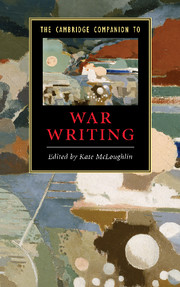Book contents
- Frontmatter
- Introduction
- Part I Themes
- Part II Influences
- Part III Poetics
- 8 Medieval warfare
- 9 Early modern war writing and the British Civil Wars
- 10 The eighteenth century and the romantics on war
- 11 American Revolutionary War writing
- 12 The Victorians and war
- 13 The American Civil War
- 14 The First World War: British writing
- 15 The First World War: American writing
- 16 The Spanish Civil War
- 17 The Second World War: British writing
- 18 The Second World War: American writing
- 19 American writing of the wars in Korea and Vietnam
- 20 The Cold War and the “war on terror”
- Index
13 - The American Civil War
from Part III - Poetics
Published online by Cambridge University Press: 28 January 2010
- Frontmatter
- Introduction
- Part I Themes
- Part II Influences
- Part III Poetics
- 8 Medieval warfare
- 9 Early modern war writing and the British Civil Wars
- 10 The eighteenth century and the romantics on war
- 11 American Revolutionary War writing
- 12 The Victorians and war
- 13 The American Civil War
- 14 The First World War: British writing
- 15 The First World War: American writing
- 16 The Spanish Civil War
- 17 The Second World War: British writing
- 18 The Second World War: American writing
- 19 American writing of the wars in Korea and Vietnam
- 20 The Cold War and the “war on terror”
- Index
Summary
No single episode in American history has spawned as much literary output as the Civil War. Indeed, it has been estimated that “more than a hundred thousand volumes” have been produced on the subject. This prodigious mass of writing is all the more compelling for the problems it has continued to raise over the location and definition of the conflict, which the American novelist and historian Shelby Foote described as “the crossroads of our nation.” No consensus has yet been reached even as to the cause or purpose of the war. Contemporary Southern partisans such as the United Daughters of the Confederacy will argue about “the truths of history (one of the most important of which is, that the War Between the States was not a rebellion, nor was its underlying cause to sustain slavery).” Thus, the war for “a new birth of freedom,” as Abraham Lincoln described it in his Gettysburg Address of 1863, is by no means universally considered as such even in this century, as the founders of the neo-Confederate organization, The League of the South, make clear in their diatribe against “the heartless brigades of Abraham Lincoln's army of Northern aggression and occupation.” The “War of the Rebellion,” the “War of Northern Aggression,” the “Civil War” - such contradictory terms are only the simplest outward markers of the problems of interpretation and situation. As Jennifer James observes, “The Civil War was nothing if not a conflict rife with conflicts.”
- Type
- Chapter
- Information
- The Cambridge Companion to War Writing , pp. 148 - 159Publisher: Cambridge University PressPrint publication year: 2009

